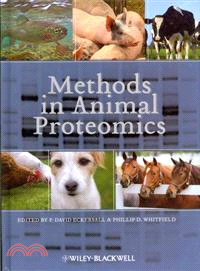商品簡介
作者簡介
David Eckersall is Professor of Veterinary Biochemistry University of Glasgow.
目次
1. General Introduction.
The basis of proteomics to provide additional perspectives in animal biology. This chapter will also set proteomics within the context of animal genome programmes and provide an outline of different proteomic strategies..
2. Types of Samples and Experimental Planning.
The types of samples used in animal proteomics experiments and the methodologies routinely used in the preparation of samples from the main body fluids and tissues of interest (blood, blood cells, muscle, liver, kidney, lung, intestine. CNS, CSF, urine, milk, venom). The analysis of proteins from different cellular fractions will be discussed..
3. Protein Separation Strategies.
This will cover electrophoretic and chromatographic techniques used for protein separation and isolation such as 1D and 2D SDS-PAGE, liquid chromatography, ion exchange chromatography and size exclusion chromatography..
4. Methods for Protein Identification.
This chapter will discuss the mass spectrometric analyses in protein identification. This will cover the analyses intact proteins, the use of peptide mass fingerprinting and de novo sequencing strategies. The variety of instrument platforms routinely used in proteomics experiments will be also described, for example MALDI-TOF-MS, LC-MS/MS and MudPIT. The use of antibody-based approaches such as ELISA, protein arrays and western blotting to confirm protein identities will be explored..
5. Comparative Proteomic Approaches.
This chapter will discuss the theoretical and practical aspects of methods used in comparative proteomic analysis. This will cover gel-based strategies including the densitometric analysis of 1D and 2D gels and DIGE and the use of mass spectrometric approaches to determine the relative and absolute concentrations of proteins. The evaluation and interpretation of the quantitative proteomic data and the use of univariate and multivariate statistical analysis will also be discussed..
6. Advancing Technologies for Spatial and Temporal Proteomics.
This chapter will outline a number of emerging technologies that have been developed for proteome simplification, protein turnover, post-translational modifications and protein-protein interactions. The ability of these approaches to explore animal proteomes greater depth will be described and how they can provide functional information to reveal how the whole organism works..
7. Bioinformatics and Data Mining in Animal Proteomics.
The section will outline the application of bioinformatics in relating proteome data to animal genomes and how this information can be used to establish testable hypotheses to address questions of relevance to animal physiology and disease. The databases used in the identification of proteins and the value of cross-species matching in animal proteomics investigations will be discussed..
SECTION II: APPLICATIONS OF PROTEOMICS IN ANIMAL BIOLOGY.
8. Application of Proteomics to Studies on Phylogeny and Evolution.
This chapter will outline the role proteomic strategies in molecular evolution studies to the application of these approaches to discover phylogenetic relationships among species and the evolutionary processes that caused the sequences to divergence..
9. Proteomic Strategies to Investigate Adaptive Processes.
Living organisms rarely exist in unchanging environments and many external factors can dominate their life strategies. This chapter will discuss how defining an animal’s response to changing environmental conditions at the protein level may provide fundamental insights into the molecular basis of adaptive processes..
10. Proteomics in Animal Health and Disease.
Studies where proteomics has been employed to identify diagnostic biomarkers and explore the pathophysiology of important animal diseases will be discussed. The potential use of proteomics in clinical veterinary environments will also be outlined..
11. Host-Pathogen Interactions.
Animals are constantly under challenge by pathogens that have profound effects on the cells which they invade. Understanding this interaction is of vital importance for determining the host response to infection and for the development of novel strategies for therapeutic intervention. This chapter will cover the proteomic analysis of infectious agents and studies of microbial, parasitic, viral and zoonotic infections and the use of these strategies in the identification of vaccine candidates..
12. Proteomics in Animal Reproduction and Breeding.
This chapter will cover the application of proteomic approaches to investigate fertility development and reproductive performance of production animals..
13. Investigation of Animal Venoms and Toxins.
Animal venoms often comprise of complex mixtures of proteins. This chapter will describe the use of proteomic technologies in characterizing these proteins. The application of proteomic approaches to investigate the biological and pathological activities of these venoms and to guide the development of appropriate treatments will also be discussed..
14. Assessment in the Safety and Quality of Food of Animal Origin.
Tracking quality changes in food such as meat, fish, milk and cheese using proteomics. Postmortem effects on quality and processability. Proteomics and species authentication. The identification and characterization of allergens..
SECTION III: CONCLUSIONS.
15. Challenges and Future Directions for Animal Proteomics.
How future developments in proteomics will lead to improvements in the study of animal health and disease.
主題書展
更多書展本週66折
您曾經瀏覽過的商品
購物須知
外文書商品之書封,為出版社提供之樣本。實際出貨商品,以出版社所提供之現有版本為主。部份書籍,因出版社供應狀況特殊,匯率將依實際狀況做調整。
無庫存之商品,在您完成訂單程序之後,將以空運的方式為你下單調貨。為了縮短等待的時間,建議您將外文書與其他商品分開下單,以獲得最快的取貨速度,平均調貨時間為1~2個月。
為了保護您的權益,「三民網路書店」提供會員七日商品鑑賞期(收到商品為起始日)。
若要辦理退貨,請在商品鑑賞期內寄回,且商品必須是全新狀態與完整包裝(商品、附件、發票、隨貨贈品等)否則恕不接受退貨。
























